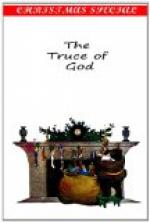The generous soldiers, who had hitherto received upon their defenceless bodies the blows aimed at Gilbert, were almost all beaten down, and in a few minutes more he would have been exposed comparatively unaided to the fury of the populace. His sword was shivered to the hilt, and though he drove back a giant who attempted to close with him, by dashing the guard in his face, he must have fallen beneath a club that swung over his head, had not a tall knight, completely clad in armor, striding before him, intercepted the blow, and dashed the assailant to the earth. A shower of blows saluted the youth’s deliverer, but he bore them unflinching, and, vigorously plying his two-handed sword, cleared a space around the exhausted Gilbert. The two other knights arriving at this moment, the contest became more equal. But the mob were now displaying deadlier weapons, and Rodolph reluctantly resolved to command his chivalry to disperse the rabble, when his soldiers arrived with their arms. Inflamed by the loss of their comrades, the now formidable troops threw themselves upon the citizens, and pursued them with great slaughter to their homes. When the knights were left without an enemy, Gilbert advanced to embrace his deliverer. But the knight of the black plume stepped back a pace, and raising his visor, disclosed the features of Henry of Stramen, cold, haughty, and showing just the traces of a smile of disdain.
Gladly at that moment would Gilbert have fallen into his arms and entreated him to forget the past; but there were too many eyes to witness a repulse. He contented himself by saying:
“Sir, you have preserved my life, and with the grace of God you shall not repent it.”
Henry made no reply, and they parted.
Gilbert was far too generous to regret an incident which laid him under such deep obligations to Henry of Stramen. He rejoiced that it had occurred, for it might remove the mortification produced by their late encounter, and diminish the mortal hatred with which he was regarded. He was also well disposed to welcome any accident that might give him a pretext for conciliating the house of Stramen. Henry perhaps secretly exulted that he had conferred a favor upon Gilbert that would gall his heart, while it poured a balm upon his own. Still he did not hold the youth in the same utter detestation as before.
On the next day, Rodolph, following an ancient custom, began a tour through his dominions.
Germany now presented the spectacle of a country claimed by two kings. To Gregory the party of the old king was heretical and odious—that of the new king pure and orthodox. Though all his sympathies were with the latter, he still openly blamed and deplored the conduct of his legates, and refused to acknowledge Rodolph as king. The Pope well knew what a delicate undertaking it was to depose a sovereign whom he had consecrated, and how fraught with danger such a precedent must be. His interest evidently called him to receive Rodolph at once into his arms, and had he done this, the result of the contest would have been very different. In the behavior of Gregory we discover, in addition to an insuperable aversion to countenance civil war, a disposition to endure the last extremity rather than dethrone a legitimate monarch, and perhaps a preference of Henry, for his parents’ sake, to his rival.




